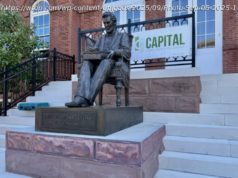The two-time Oscar winner shaped pop culture as few other screenwriters have.
William Goldman, who has died at age 87, was beloved for his classic fantasy novel The Princess Bride. The movie adaptation of the book, which Goldman also wrote, is a cult classic that left us with a litany of great lines and is one of the classic examples of a self-aware, tongue-in-cheek genre story that manages to be as sincere as it is sardonic.
But it can’t be overstated that this epic tale of romance and adventure came from the mind of a master. Goldman was a two-time Oscar winner and the writer behind several of the most venerated films in Hollywood history, spanning a huge array of genres, including war epics, spy thrillers, social satire, horror, fantasy, and much more.
Goldman won his Oscars for writing two of the most legendary screenplays of their respective decades. The first was Butch Cassidy and the Sundance Kid (1969), the classic Hollywood outlaw bromance whose $400,000 script fee was then the highest price ever paid for a screenplay. It was considered outrageously lucrative and made Goldman an instant celebrity, at a time when screenwriters weren’t really household names. The film, however, more than paid its way; dripping with wit and heart, it spawned a generation of imitation buddy comedies.
Seven years later, Goldman won his second Oscar for penning the Watergate drama All the President’s Men (1976), which remains perpetually relevant. In it, Goldman coined the phrase “Follow the money,” a line so famously prophetic that many people incorrectly think whistleblower Deep Throat said it in real life. Reportedly, even Goldman himself thought he must have gotten the quote from real-life sources, but no record of such a quote exists, except in his own brain.
In the same time period, Goldman also penned Harper (1966), a film whose opening scene is considered a master class in how to establish characterization quickly; The Hot Rock (1972), a bumbling thief comedy overlooked on its release but now considered one of the best heist films ever written; The Stepford Wives (1975), the iconic dystopian social satire that continues to influence horror films like Get Out today; and Marathon Man (1976), the terrifying Nazi thriller based on his own novel, whose famous dentist’s chair torture scene gave us another famous line at the hands of Laurence Olivier: “Is it safe?”
What’s remarkable about all these films is how varied they are in terms of genre, tone, and scope. Goldman’s screenwriting ability shone through whether he was adapting a war epic like 1977’s A Bridge Too Far or savvily taking on horror tropes, like the cheeky Anthony Hopkins flick Magic (1978). Goldman, who relied on focusing on the structure and built-in mechanics of filmmaking to guide the writing, applied his techniques to any kind of storytelling.
It’s hard to overstate how powerful this litany of screenplay successes was not only at the box office but for writers who followed in Goldman’s footsteps. By the time he wrote his 1983 book of writing advice, Adventures in the Screen Trade, he was considered an industry guru, one who’d morphed from an overrated wunderkind in the era of Butch Cassidy into a lauded veteran. Goldman became known from then until his death for his wry and trenchant advice about filmmaking, best summed up in what became his famous aphorism, “ Nobody knows anything.”
During the ’80s, director Rob Reiner fought to bring The Princess Bride, Goldman’s 1973 children’s fantasy novel, to the screen. Brilliant in its own way, the novel is full of beautiful writing, wry humor, and philosophical meditations on life.
It also has a hilariously satirical framing device in which Goldman, snarking about his own Hollywood celebrity, paints a fictional version of himself finding an old, original version of the “real” book and deciding to “abridge” it because it’s so verbose — a riff on his own work as a screenwriter attempting to adapt the works of other writers. Except Goldman plays his framing device so straightforwardly that readers frequently believe Goldman didn’t actually write the book, and that there’s an “original” copy somewhere out there by the “real” writer — the novel’s fictional author, S. Morgenstern.
Most of this was understandably cut from the film, which had a rocky time getting off the ground because it was such an unconventional, difficult-to-market fantasy. Where previous directors, including François Truffaut, had failed to convince movie studios to support the film, Reiner succeeded, mainly due to a teensy budget, a cast of relative unknowns, and Goldman’s instantly immortal screenplay.
“I remember doing the scene with [Wallace Shawn] where I’m blindfolded outside,” star Robin Wright recalled for Entertainment Weekly’s oral history of the film in 2011. “The dialogue that Wally has in that scene — it just hit me at that moment: This is not just a fantasy picture. This is not a Robin Hood repeat. This is unique. And it was all on the page. William Goldman’s words were ironic and humorous and wry and very smart.”
The Princess Bride was a sleeper hit whose mild box office success begat soaring home video sales. While it was slowly building its now-massive fan base, Goldman spent the ’90s churning out yet another string of cultural and box office successes. These include the acclaimed adaptation of Stephen King’s Misery (1990), which won Kathy Bates an Oscar and made her a household name; the box office smash comedy-Western Maverick (1994); and the Clint Eastwood thriller Absolute Power (1997). His jungle thriller Ghost in the Darkness (1996) flopped but has gradually become considered an underrated cult classic.
Throughout the ’80s and ’90s, Goldman found additional success as an uncredited but highly paid script doctor on countless Hollywood screenplays, including A Few Good Men, Indecent Proposal, and Dolores Claiborne. He also co-wrote the sumptuous biopic Chaplin (1992).
It’s for his wisdom about the craft, and for his beloved fantasy classic, that Goldman will be most fondly remembered. That’s entirely understandable.
But when we’re replying, “As you wish,” to one another, or discussing Rodents of Unusual Size, or snarking about land wars in Asia and things that are inconceivable, or any of the other famous quotes The Princess Bride left us with, it’s important to recall that none of these quips were created in a burst of spontaneous genius.
Домой
United States
USA — Art The author of The Princess Bride shaped pop culture as few screenwriters...






